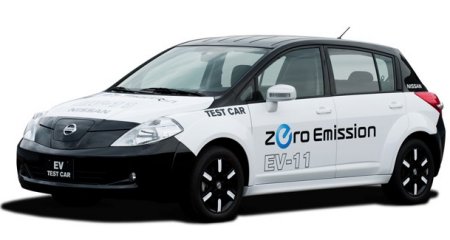Nissan Tiida used as base for future electric tech

Nissan has previewed its electric vehicle platform on a Tiida-based prototype in their quest for a pure zero-emissions vehicle. They also showcased a sophisticated EV-IT system developed to support electric driving 24 hours a day.
The dedicated EV platform is comprised of a highly rigid body, high-performance motor, compact lithium-ion battery with high power output and energy capacity.
The in-house developed electric motor delivers 80 kW, equivalent to 280 Nm, which should account for strong acceleration. Nissan’s unique motor control also contributes to the vehicle’s seamless acceleration.
The 24 kWh laminated compact lithium-ion battery pack is placed under the vehicle floor for more efficient packaging, without compromising cabin or cargo space. The battery layout also allows smooth underfloor air-flow which helps reduce drag. Additionally, the regenerative brake system employed to recharge the battery during deceleration and braking extends the driving range to more than 160 km under a full charge.
High durability is achieved by employing an additional frame for the battery pack to significantly improve the rigidity of the platform. The combination of a high rigidity platform and electric powertrain aims to minimise vibration and external sounds to produce a quiet and pleasing drive.
Nissan has developed an sophisticated IT system for its zero-emission EVs, connecting the vehicle’s on-board transmitting unit to a global data center to support EV driving 24 hours 7 days a week.
With a simple touch of a button, the navigation map shows the driving radius within range under the current state of charge. The system can calculate if the vehicle is within range of a pre-set destination.
The timer function enables the air-conditioner or battery charging to begin at a specified time. The air-conditioner can be pre-set while the vehicle is plugged-in to cool the cabin to a desirable temperature before driving begins, without taxing the vehicle’s battery. Meanwhile, the battery charging can be set to start at a specified time at night to benefit from more favorable electricity rates.
The driver can monitor the state-of-charge of the EV via an online website and a cellular phone.
The all-electric vehicle slated for launch in 2010 will have a unique design and body. Nissan plans to unveil the design of the production EV at its new Global Headquarters Opening in Yokohama on August 2 this year. There are no immediate plans to offer the model in the GCC, although Nissan Middle East seems enthusiastic about this development.
There are no comments. Be the first!